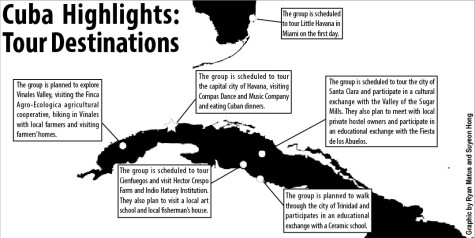Cuba opens doors to student travelers

Biking along the outskirts of Havana, social studies teacher David Vincent came across a Cuban military installment with six stationary missile mountings and a group of soldiers outside practicing drills. Wanting to document the rare site of a foreign military site, Vincent began taking pictures until he found out he could be arrested for photographing a classified operation in Cuba.
“A soldier from the regiment looked my way and motioned vigorously for me to cease and move on,” said Vincent. “I obliged, not wanting to end up in a Cuban prison cell, part of an international scandal and re-ignition of Cold War tensions. In retrospect, this was a pretty foolhardy and impetuous move on my part, but that’s youth for you.”
This was one of the many memorable moments from Vincent’s college trip to Cuba almost 20 years ago, an extremely rare location for Americans to visit at the time. Vincent said he had always wanted to visit the country again, and this spring break, Vincent has the chance to re-experience Cuba, except this time with 28 students.
“Obama loosened the [travel] restrictions back in September 2015, and he expanded programs that had a humanitarian or educational purpose which sort of freed these tour operators to then open up Cuba to business,” said Vincent. “We have to get visas, but the [travel] company takes care of that.”
Vincent, along with four other chaperones, booked the trip through the traveling company Explorica, and the trip is scheduled to leave March 26 and return April 3. Vincent said the itinerary includes visits to museums, historical sites, dance performances and baseball games.
One of the travelers, junior Melissa Spero, decided to go on the trip to visit a country that is underdeveloped.
“I chose to go because I think it’ll be a really cool experience going to a place that hasn’t developed like the rest of the world and is almost stuck in time,” said Spero. “Everything in Cuba compared to here is old-fashioned, like the cars, because we’ve grown in ways that they haven’t.”
Although the United States’ past relationship with Cuba portrays the country as being an unsafe place to travel, Vincent said he does not have any safety concerns when traveling to Cuba.
“Something I’ve talked a lot about with this group and their parents is that Cuba’s crime statistics indicate that it’s about the safest [country] in the entire hemisphere, far safer than our country and certainly than Chicago,” Vincent said.
Vicky Sokol, the mother of junior Danielle Sokol, who is also attending the spring break trip, said she is glad her daughter will be able to experience Cuba culturally and get a broader perspective of the world, but she is worried about communication.
“She’s traveling to a foreign country, where I was informed there is no cellular data,” said Vicky Sokol. “So she can’t call, and there is Wi-Fi available at the hotel, but I’m sure that’s not going to be the most proficient Internet. I’m going to have limited communication with her.”
Vincent imagines some aspects to be the same as they were his last visit, but he also recognizes the possible differences, such as Wi-Fi, hotels, private businesses and the political culture.
“I’m curious to see [Cuba] now that our relations have warmed,” said Vincent. “Will there be more pro-American slogans? I’ll be looking for signs of this insidious creep of capitalism which could bring many good things to Cuba, but I’m also a little fearful of what they will do to Cuba’s more unique and genuine cultural traits.”
Ultimately, Vincent is glad the students will be able to experience Cuba outside a classroom.
“Many of [the students] took my class, Comparative Global Issues, with a whole unit on Cuba,” said Vincent. “It’s such a unique opportunity for students, and who knows how Cuba might change radically within the next five years or so.”

